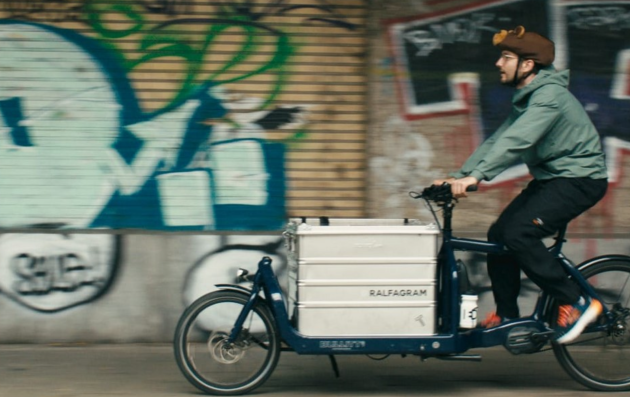Date of label : 29/10/2024
-
Brussels Capital Region , Belgium
-
Size of city : 1.241.175 inhabitants

A person riding a cargo bike. The scene reflects a blend of urban cycling culture and a focus on sustainable transportation methods, particularly with the cargo bike.
Summary
The cAIRgo Bike initiative in the Brussels-Capital Region (BE) improves air quality and urban mobility by promoting the use of cargo bikes. This project, co-funded by the EU Urban Innovative Actions Programme, integrates public and private sector efforts to reduce traffic congestion, support local businesses, and foster a culture of sustainable transport. Through subsidies, shared bike schemes, and extensive community engagement, cAIRgo Bike makes sustainable transport accessible to all.
The solutions offered by the Good Practice
The cAIRgo Bike project, launched by Brussels-Capital Region, promotes sustainable urban transport by encouraging the use of cargo bikes. It addresses issues such as air pollution and traffic congestion, by offering subsidies for cargo bike purchases (up to 4 000 EUR for bikes and 2 000 EUR for trailers), shared bike systems, and dedicated parking solutions. The project also involves training programmes for families and businesses on safe and efficient bike use.
Collaboration is key: public bodies, local NGOs and private companies, including over 220 organisations and 40 large companies, have participated. Over 330 users have been trained, with over 150 people using cargo bikes daily.
Results show improved air quality, reduced traffic, and increased community engagement. There are plans to expand the shared bike network, training programmes, and private sector partnerships, in the light of user feedback.
Building on the sustainable and integrated urban approach
cAIRgo Bike’s integrated approach unites regional departments responsible for urban mobility, the environment and the economy, to efficiently use resources and align with policy goals. Engaging with multiple stakeholders creates a cohesive, sustainable strategy.
Environmental: By promoting cargo bike use over motor vehicles, the project reduces air pollution and greenhouse gas emissions, supporting Brussels' Low Emission Zone and Good Move Regional Mobility Plan.
Economic: Subsidies make cargo bikes more affordable, while the project helps small businesses adopt sustainable practices by reducing fuel and vehicle maintenance costs. The initiative also creates jobs in bike maintenance, training, and shared bike system management.
Social: Inclusivity is enhanced by making sustainable transport more accessible, via subsidies, bike sharing and training programmes. The participatory approach, involving public authorities, NGOs, companies and communities, fosters shared responsibility. Reduced traffic improves air quality and makes streets safer.
Based on participatory approach
Public authorities work closely with cycling sector representatives, SMEs, and local community groups, like BePark, Parking.brussels, Pro Velo, Remorquable, Urbike, and the Mobilise research group of the Vrije Universiteit Brussel. A Stakeholder News Bulletin, consultations, workshops, surveys and training sessions also enhance engagement and help the project adapt to user feedback.
Information campaigns and trial sessions give citizens first-hand experience of cargo bikes. Economic incentives, such as offered by vehicle-hire partner Cambio, encourage more people to use electric bikes.
Cross-sector partnerships enhance the project’s effectiveness, for example, with local businesses receiving tailored subsidies while NGOs ensure inclusivity. Challenges to overcome include delays in establishing electric bike charging stations, and persuading condominium owners to create shared bike parking spaces.
What difference has it made?
Urban mobility and air quality: Brussels Environment found a 33% reduction in exposure to black carbon for cyclists compared to car users during peak hours, and a 35% reduction during off-peak hours.
Community engagement: Over 700 individuals participated in consultations, and 447 households tested cargo bikes - 73% found them useful and 62% intended to purchase one. Over 220 organisations, including 40 large companies, demonstrated the potential for professional adoption of cargo bikes, with over 330 business professionals trained in cargo bike use, and more than 150 experiencing the benefits of cargo bikes in their work.
Support for local businesses: Subsidies of up to 4 000 EUR for cargo bikes and 2 000 EUR for trailers made them attractive to entrepreneurs and SMEs. The Brussels-Capital Region started integrating such financial incentives into its economic expansion grants in 2024.
The project aims to expand and further integrate with regional mobility strategies, using ongoing feedback to ensure long-term success.
Why this Good Practice should be transferred to other cities
The cAIRgo Bike project contributes to:
- Sustainable Development Goals (SDGs): SDG 11 (Sustainable Cities and Communities) and SDG 13 (Climate Action) by reducing emissions and improving air quality.
The Urban Agenda for the EU and the Territorial Agenda 2030, by addressing traffic congestion and pollution using integrated and participatory approaches.
The success of the project in the Brussels-Capital Region shows its potential for replication in other European cities and regions. Its approach has been shared in Belgium, especially to support cargo bike purchase schemes in the Walloon Region.
Strong political support, adequate funding, effective collaboration among stakeholders (public authorities, companies, NGOs, and citizens), and community engagement are key factors for a successful transfer of the good practice. Other cities can modify core components like public-private partnerships and financial incentives to suit their specific needs. The cAIRgo Bike initiative has been presented at various European conferences, where exchanges have provided insights into how the approach can be customised.
